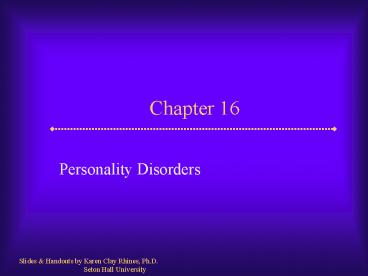Personality Disorders PowerPoint PPT Presentation
1 / 31
Title: Personality Disorders
1
Chapter 16
- Personality Disorders
Slides Handouts by Karen Clay Rhines,
Ph.D. Seton Hall University
2
Who Are You?
- In five words or less, describe your personality
3
Personality
- What is personality?
- Unique and long-term pattern of inner experience
and outward behavior - Consistent
- Traits
- These traits may be inherited, learned, or both
- Flexible
- What is a personality disorder?
4
Classifying Personality Disorders
- Impairments in social or occupational
functioning, or personal distress - Adolescence or early adulthood
- Undesirable or problematic behavior?
- Difficulty classifying
- Co-morbidity
5
What Problems Are Posed by the DSM Categories?
- Validity and reliability
- Differentiation b/ Axis I and Axis II
- Overlap
- Distinguishing b/ normal and abnormal behavior
- Sexist
6
Classifying Personality Disorders
- The DSM-IV identifies ten personality disorders
and separates these into three categories or
clusters - Odd or eccentric behavior
- Dramatic, emotional, or erratic behavior
- Anxious or fearful behavior
7
Odd Personality Disorders
- Paranoid Personality Disorder
- Schizoid Personality disorder
- Schizotypal Personality Disorder
8
Paranoid Personality Disorder
- Characterized by deep suspicion or mistrust of
others - Not delusional
- Avoidance of relationships
- Hypersensitivity, vigilance, and caution
9
Treatments for Paranoid Personality Disorder
- People with paranoid personality disorder do not
typically see themselves as needing help - Object relations therapists
- Behavioral and cognitive therapists
- Drug therapy
10
Schizoid Personality Disorder
- Characterized by persistent avoidance of social
relationships and limited emotional expression - Extreme social withdrawal prevents them from
seeking treatment
11
Treatments for Schizoid Personality Disorder
- Cognitive therapists
- Behavioral therapists
- Group therapy
- Drug therapy
12
Schizotypal Personality Disorder
- Characterized by a range of interpersonal
problems, odd (even bizarre) ways of thinking and
perceiving, and behavioral eccentricities - Ideas of reference and/or bodily illusions
- Attention problems
- Isolation
- Most severe of the three in this cluster
13
Treatments for Schizotypal Personality Disorder
- Reconnect
- Recognize limitations
- Antipsychotic drugs
14
Dramatic Personality Disorders
- Antisocial personality disorder
- Borderline personality disorder
- Histrionic personality disorder
- Narcissistic personality disorder
15
Antisocial Personality Disorder
- Psychopaths or sociopaths
- Persistently disregard and violate others rights
- Have to be at least 18 years of age to receive
this diagnosis - Caucasians/African Americans
- Men/Women
- Conduct disorder/Attention-deficit hyperactivity
disorder
16
Treatments for Antisocial Personality Disorder
- About 25 of all people with antisocial
personality disorder receive treatment for it,
yet no treatment appears to be effective - Cognitive therapists
- Little or no impact on the disorder
17
Borderline Personality Disorder
- Instability, including major shifts in mood, an
unstable self-image, unstable relationships, and
impulsivity - Their impulsive, self-destructive behavior can
include - Alcohol and substance abuse
- Reckless behavior, including driving and unsafe
sex - Cutting themselves
- Suicidal actions and threats
18
Borderline Personality Disorder
- Almost 2 of the general population are thought
to suffer from this disorder - Close to 75 of those diagnosed are women
- The course of the disorder varies
19
Treatments for Borderline Personality Disorder
- It appears that psychotherapy can eventually lead
to some degree of improvement for people with
this disorder - Not easy!!
- Psychodynamic Cognitive-behavioral
Dialectical behavior therapy - Group therapy
- Antidepressant, antibipolar, antianxiety, and
antipsychotic drugs - Combination of drug therapy and psychotherapy
20
Histrionic Personality Disorder
- Extremely emotional and continually seek to be
the center of attention - Once believed to be more common in women than in
men - 2 of adults have this personality disorder,
with males and females equally affected
21
Treatments for Histrionic Personality Disorder
- Cognitive therapists
- Psychodynamic therapy and group therapy
- Drug therapy
22
Narcissistic Personality Disorder
- Generally grandiose, need much admiration, and
feel no empathy for others - Seldom interested in the feelings of others
- Less than 1 of adults display narcissistic
personality disorder - Up to 75 of these are men
- Normal teenagers
23
Treatments for Narcissistic Personality Disorder
- One of the most difficult personality patterns to
treat - None of the major treatment approaches have had
much success
24
Anxious Personality Disorders
- Avoidant Personality Disorder
- Dependent Personality Disorder
- Obsessive-Compulsive Personality Disorder
25
Avoidant Personality Disorder
- Uncomfortable and restrained in social
situations, overwhelmed by feelings of
inadequacy, and extremely sensitive to negative
evaluation - Similar to social phobia
26
Treatments for Avoidant Personality Disorder
- People with avoidant personality disorder come to
therapy seeking acceptance and affection - Building trust
- Group and drug therapy
27
Dependent Personality Disorder
- Pervasive, excessive need to be taken care of
- Central feature difficulty with separation
- Feel distressed, lonely, and sad
- Depression and anxiety disorders
- Suicidal thoughts
28
Treatments for Dependent Personality Disorder
- In therapy, people with this disorder usually
place all responsibility for their treatment on
the clinician - Accepting responsibility for themselves
- Couple or family therapy can be helpful often
recommended
29
Treatments for Dependent Personality Disorder
- Treatment can be at least modestly helpful
- Psychodynamic therapy
- Cognitive therapists
- Antidepressant drug therapy
- Group therapy
30
Obsessive-Compulsive Personality Disorder
- So focused on order, perfection, and control that
they lose all flexibility, openness, and
efficiency - Education, Marital status, and Employment status
- Gender
- Obsessive-compulsive personality disorder and
obsessive-compulsive disorder
31
Treatments for Obsessive-Compulsive Personality
Disorder
- Unlikely to seek treatment unless they also are
suffering from another disorder, most frequently
anxiety or depression

